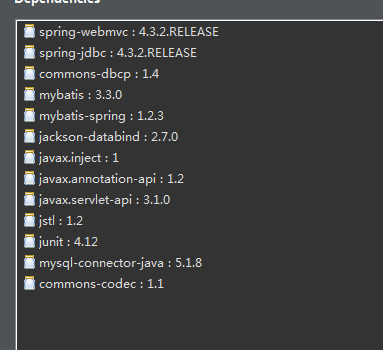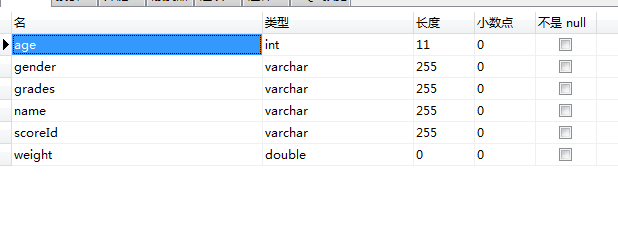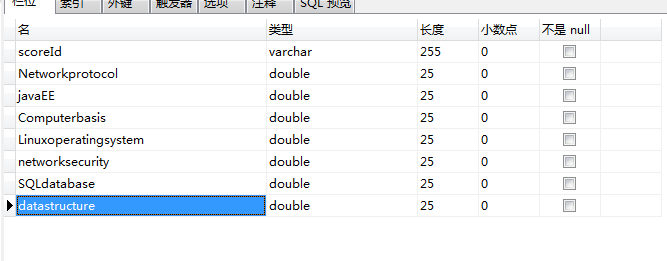关于json格式字符串解析并用mybatis存入数据库
园子里面找了很多关于json解析后存入数据库的方法,不是太乱,就是没有写完,我下面的主题代码多是受下面两位的启发,请按顺序查看
http://www.cnblogs.com/tian830937/p/6364622.html,我沿用了这个例子中的json数据格式,多层嵌套。
http://blog.csdn.net/baicp3/article/details/46711067,这个例子虽然是反例,但是引出了JsonArray。方便后续开发。
看完明白上面两个例子后,我们就可以开始了。(注意:没有看懂上面的例子请先看懂,当然,下面的代码复制过去都能用的,最主要是理解)
1.包,请到http://maven.aliyun.com获取,然后复制到pom.xml中

2.配置mybatis.xml,文件放在resource文件夹下,关于数据库的连接就不多讲,照代码中做就是
<?xml version="1.0" encoding="UTF-8"?> <beans xmlns="http://www.springframework.org/schema/beans" xmlns:xsi="http://www.w3.org/2001/XMLSchema-instance" xmlns:context="http://www.springframework.org/schema/context" xmlns:jdbc="http://www.springframework.org/schema/jdbc" xmlns:jee="http://www.springframework.org/schema/jee" xmlns:tx="http://www.springframework.org/schema/tx" xmlns:aop="http://www.springframework.org/schema/aop" xmlns:mvc="http://www.springframework.org/schema/mvc" xmlns:util="http://www.springframework.org/schema/util" xmlns:jpa="http://www.springframework.org/schema/data/jpa" xsi:schemaLocation=" http://www.springframework.org/schema/beans http://www.springframework.org/schema/beans/spring-beans-3.2.xsd http://www.springframework.org/schema/context http://www.springframework.org/schema/context/spring-context-3.2.xsd http://www.springframework.org/schema/jdbc http://www.springframework.org/schema/jdbc/spring-jdbc-3.2.xsd http://www.springframework.org/schema/jee http://www.springframework.org/schema/jee/spring-jee-3.2.xsd http://www.springframework.org/schema/tx http://www.springframework.org/schema/tx/spring-tx-3.2.xsd http://www.springframework.org/schema/data/jpa http://www.springframework.org/schema/data/jpa/spring-jpa-1.3.xsd http://www.springframework.org/schema/aop http://www.springframework.org/schema/aop/spring-aop-3.2.xsd http://www.springframework.org/schema/mvc http://www.springframework.org/schema/mvc/spring-mvc-3.2.xsd http://www.springframework.org/schema/util http://www.springframework.org/schema/util/spring-util-3.2.xsd"> <!-- 配置连接mysql --> <!-- 已测试 --> <bean id="dataSource" class="org.apache.commons.dbcp.BasicDataSource"> <property name="driverClassName" value="com.mysql.jdbc.Driver"/> <property name="url" value="jdbc:mysql://localhost:3306/(数据库名)?useUnicode=true&characterEncoding=utf8"/><!-- localhost:3307 --> <property name="username" value="root"/> <property name="password" value="123456"/> </bean> <!-- 配置MyBatis mapper接口扫描 --> <bean id="sqlSessionFactory" class="org.mybatis.spring.SqlSessionFactoryBean"> <property name="dataSource" ref="dataSource"/> <property name="mapperLocations" value="classpath:(mapper文件夹名)/*.xml"/> </bean> <bean class="org.mybatis.spring.mapper.MapperScannerConfigurer"> <!-- <property name="sqlSessionFactory" ref="sqlSessionFactory"/> --> <property name="basePackage" value="(项目dao层的位置,如:xxx.xxx.dao)"/> </bean> </beans>
3.设计实体类(实体类是按照要解析的json数据确定的)
student实体类
package com.bean;
import java.util.Map;
public class Student {
private int age;//年龄
private String gender;//性别,male/female
private String grades;//班级
private String name;//姓名
private Map<String, Double> score;//各科分数
private String scoreId;
private Double weight;//体重
public Student() {
// TODO Auto-generated constructor stub
}
public Student(int age, String gender, String grades, String name, String scoreId, Double weight) {
super();
this.age = age;
this.gender = gender;
this.grades = grades;
this.name = name;
this.weight = weight;
this.scoreId=scoreId;
}
public String getScoreId() {
return scoreId;
}
public void setScoreId(String scoreId) {
this.scoreId = scoreId;
}
public Double getWeight() {
return weight;
}
public void setWeight(Double weight) {
this.weight = weight;
}
public int getAge() {
return age;
}
public void setAge(int age) {
this.age = age;
}
public String getGender() {
return gender;
}
public void setGender(String gender) {
this.gender = gender;
}
public String getGrades() {
return grades;
}
public void setGrades(String grades) {
this.grades = grades;
}
public String getName() {
return name;
}
public void setName(String name) {
this.name = name;
}
public Map<String, Double> getScore() {
return score;
}
public void setScore(Map<String, Double> score) {
this.score = score;
}
@Override
public String toString() {
return "Student [age=" + age + ", gender=" + gender + ", grades=" + grades + ", name=" + name + ", score="
+ score + ", weight=" + weight + "]";
}
}
Score实体类
package com.bean; public class Score { private String scoreId; private Double Networkprotocol;//网络协议 private Double javaEE; private Double Computerbasis;//计算机基础 private Double Linuxoperatingsystem;//Linux操作系统 private Double networksecurity;//网络安全 private Double SQLdatabase;//Sql数据库 private Double datastructure;//数据结构 public Score() { // TODO Auto-generated constructor stub } public Score(String scoreId, Double networkprotocol, Double javaEE, Double computerbasis, Double linuxoperatingsystem, Double networksecurity, Double sQLdatabase, Double datastructure) { super(); this.scoreId = scoreId; Networkprotocol = networkprotocol; this.javaEE = javaEE; Computerbasis = computerbasis; Linuxoperatingsystem = linuxoperatingsystem; this.networksecurity = networksecurity; SQLdatabase = sQLdatabase; this.datastructure = datastructure; } public String getScoreId() { return scoreId; } public void setScoreId(String scoreId) { this.scoreId = scoreId; } public Double getNetworkprotocol() { return Networkprotocol; } public void setNetworkprotocol(Double networkprotocol) { Networkprotocol = networkprotocol; } public Double getJavaEE() { return javaEE; } public void setJavaEE(Double javaEE) { this.javaEE = javaEE; } public Double getComputerbasis() { return Computerbasis; } public void setComputerbasis(Double computerbasis) { Computerbasis = computerbasis; } public Double getLinuxoperatingsystem() { return Linuxoperatingsystem; } public void setLinuxoperatingsystem(Double linuxoperatingsystem) { Linuxoperatingsystem = linuxoperatingsystem; } public Double getNetworksecurity() { return networksecurity; } public void setNetworksecurity(Double networksecurity) { this.networksecurity = networksecurity; } public Double getSQLdatabase() { return SQLdatabase; } public void setSQLdatabase(Double sQLdatabase) { SQLdatabase = sQLdatabase; } public Double getDatastructure() { return datastructure; } public void setDatastructure(Double datastructure) { this.datastructure = datastructure; } @Override public String toString() { return "Score [scoreId=" + scoreId + ", Networkprotocol=" + Networkprotocol + ", javaEE=" + javaEE + ", Computerbasis=" + Computerbasis + ", Linuxoperatingsystem=" + Linuxoperatingsystem + ", networksecurity=" + networksecurity + ", SQLdatabase=" + SQLdatabase + ", datastructure=" + datastructure + "]"; } }
4.配置dao,建立dao接口
package company.order.dao; import com.bean.Score; import com.bean.Student; public interface TestDao { int addStudent(Student student); int addScore(Score score); }
5.设计数据库表结构
student表结构

score表结构

6.配置mapper.xml,注意修改路径
<?xml version="1.0" encoding="UTF-8" ?>
<!DOCTYPE mapper PUBLIC "-//ibatis.apache.org//DTD Mapper 3.0//EN"
"http://ibatis.apache.org/dtd/ibatis-3-mapper.dtd">
<mapper namespace="company.order.dao.TestDao">
<!--测试将json解析的数据存入到数据库 -->
<insert id="addStudent" parameterType="com.bean.Student">
insert into student(
age,
gender,
grades,
name,
scoreId,
weight
)values(
#{age},
#{gender},
#{grades},
#{name},
#{scoreId},
#{weight}
)
</insert>
<insert id="addScore" parameterType="com.bean.Score">
insert into score(
scoreId,
Networkprotocol,
javaEE,
Computerbasis,
Linuxoperatingsystem,
networksecurity,
SQLdatabase,
datastructure
)values(
#{scoreId},
#{Networkprotocol},
#{javaEE},
#{Computerbasis},
#{Linuxoperatingsystem},
#{networksecurity},
#{SQLdatabase},
#{datastructure}
)
</insert>
</mapper>
7.上面的准备工作就做好了,然后就是核心业务(模拟的是service业务层)
(1).将json格式字符串解析成想要的数据格式
(2).将数据封装jsonarray
(3).遍历jsonArray,将object数据封装为JSONObject
(4).运用JSONObject.toBean方法,将其封装为实体类对象
(5).写入数据库
import java.util.UUID; import org.junit.Before; import org.junit.Test; import org.springframework.context.support.ClassPathXmlApplicationContext; import company.order.dao.TestDao; import net.sf.json.JSONArray; import net.sf.json.JSONObject; public class Domain { ClassPathXmlApplicationContext ctx; @Before public void init(){ ctx=new ClassPathXmlApplicationContext("backstage-mybatis.xml"); } /** *这个测试的代码相当于service业务层的代码 */ @Test public void testJson(){ TestDao dao=ctx. getBean("testDao", TestDao.class); String jsonstr = "{\"name\":\"三班\",\"students\":[{\"age\":25,\"gender\":\"female\",\"grades\":\"三班\",\"name\":\"露西\",\"score\":{\"网络协议\":98,\"JavaEE\":92,\"计算机基础\":93},\"weight\":51.3},{\"age\":26,\"gender\":\"male\",\"grades\":\"三班\",\"name\":\"杰克\",\"score\":{\"网络安全\":75,\"Linux操作系统\":81,\"计算机基础\":92},\"weight\":66.5},{\"age\":25,\"gender\":\"female\",\"grades\":\"三班\",\"name\":\"莉莉\",\"score\":{\"网络安全\":95,\"Linux操作系统\":98,\"SQL数据库\":88,\"数据结构\":89},\"weight\":55}]}"; int strstrat=jsonstr.indexOf("["); int endstrat=jsonstr.lastIndexOf("]")+1; //将数据分成jsonArray String jsonStr=jsonstr.substring(strstrat, endstrat); //System.out.println(jsonStr); JSONArray jsonArray=new JSONArray(); jsonArray =JSONArray.fromObject(jsonStr); for (Object object : jsonArray) { JSONObject jsonObject=JSONObject.fromObject(object); Student studentData=(Student) JSONObject.toBean(jsonObject, Student.class); //System.out.println(studentData); String ScoreId= UUID.randomUUID().toString(); //System.out.println(ScoreId); studentData.setScoreId(ScoreId);//设计ScoreId方便以后关联查询 Student student=new Student(studentData.getAge(), studentData.getGender(), studentData.getGrades(), studentData.getName(), studentData.getScoreId(), studentData.getWeight()); //System.out.println(student); int a=dao.addStudent(student);//将学生信息写入到数据库 Map<String,Double> Scores= studentData.getScore(); //遍历Scores,将单个数据存入到数据库 /*map遍历总结 * http://www.cnblogs.com/blest-future/p/4628871.html * */ Score scoreData=new Score(); for (Map.Entry<String , Double> entry : Scores.entrySet()) { //Map.entry<Integer,String> 映射项(键-值对) 有几个方法:用上面的名字entry //entry.getKey() ;entry.getValue(); entry.setValue(); //map.entrySet() 返回此映射中包含的映射关系的 Set视图。 //System.out.println("key= " + entry.getKey() + " and value= "+ entry.getValue()); if(entry.getKey().equals("网络协议")){ scoreData.setNetworkprotocol(Double.parseDouble(entry.getValue()+"")); } if(entry.getKey().equals("JavaEE")){ scoreData.setJavaEE(Double.parseDouble(entry.getValue()+"")); } if(entry.getKey().equals("计算机基础")){ scoreData.setComputerbasis(Double.parseDouble(entry.getValue()+"")); } if(entry.getKey().equals("网络安全")){ scoreData.setNetworksecurity(Double.parseDouble(entry.getValue()+"")); } if(entry.getKey().equals("Linux操作系统")){ scoreData.setLinuxoperatingsystem(Double.parseDouble(entry.getValue()+"")); } if(entry.getKey().equals("SQL数据库")){ scoreData.setSQLdatabase(Double.parseDouble(entry.getValue()+"")); } if(entry.getKey().equals("数据结构")){ scoreData.setDatastructure(Double.parseDouble(entry.getValue()+"")); } } Score score=new Score(ScoreId, scoreData.getNetworkprotocol(), scoreData.getJavaEE(), scoreData.getComputerbasis(), scoreData.getLinuxoperatingsystem(), scoreData.getNetworksecurity(), scoreData.getSQLdatabase(), scoreData.getDatastructure()); int b=dao.addScore(score); System.out.println("学生:"+a+";成绩:"+b); } //JSONObject jsonObject = JSONObject.fromObject(jsonStr); //Grades grades = (Grades) JSONObject.toBean(jsonObject, Grades.class); //System.out.println(grades); //System.out.println(grades.getName()); //System.out.println(grades.getStudents()); } }
8.结果:






